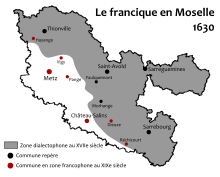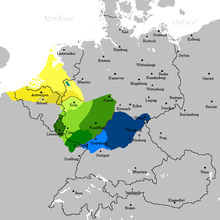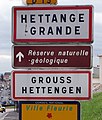| Revision as of 11:18, 26 May 2020 editAnael Hagner (talk | contribs)Extended confirmed users1,257 edits it can't be classified like this, because of Moselle Franconian and Luxembourgish areas.← Previous edit | Revision as of 02:06, 8 June 2020 edit undo2604:6000:1513:8235:8d19:b393:390e:1112 (talk)No edit summaryTags: Mobile edit Mobile web editNext edit → | ||
| Line 12: | Line 12: | ||
| |fam2 = ] | |fam2 = ] | ||
| |fam3 = ] | |fam3 = ] | ||
| | |
|fam = ] | ||
| |fam5 = ] | |fam5 = ] | ||
| |fam6 = ] | |fam6 = ] | ||
| |fam7 = ] | |||
| |minority = {{FRA|France}} | |minority = {{FRA|France}} | ||
| |agency = ''No official regulation'' | |agency = ''No official regulation'' | ||
Revision as of 02:06, 8 June 2020
Not to be confused with Lorrain dialect or Alsatian dialect. "Francique" redirects here. For the Grenadian athlete, see Alleyne Francique.| Lorraine Franconian | |
|---|---|
| Lottrìnger Plàtt | |
| Native to | France |
| Region | Moselle |
| Native speakers | (c. 360,000 cited 1962) |
| Language family | Indo-European
|
| Official status | |
| Recognised minority language in | |
| Regulated by | No official regulation |
| Language codes | |
| ISO 639-3 | – |
| Glottolog | loth1238 Lothringisch |
 Dialects of Moselle. Those in purple areas are lumped under the term "Lorraine Franconian" when spoken in France. Dialects of Moselle. Those in purple areas are lumped under the term "Lorraine Franconian" when spoken in France. | |
| Part of a series on |
| Lorraine |
|---|
 Flag of Lorraine since the 13th century Flag of Lorraine since the 13th century |
| History |
| Culture |
| Religion |
| Law |
Administrative divisions
|
| Lorraine in the EU |
| Related topics |


Lorraine Franconian (Lorraine Franconian: Plàtt or lottrìnger Plàtt; Template:Lang-fr or platt lorrain; Template:Lang-de) is an ambiguous designation for dialects of West Central German (Template:Lang-de), a group of High German dialects spoken in the Moselle department of the former north-eastern French region of Lorraine (See Linguistic boundary of Moselle).
Description
The term Lorraine Franconian has multiple denotations. Some scholars use it to refer to the entire group of West Central German dialects spoken in the French Lorraine region. Others use it more narrowly to refer to the Moselle Franconian dialect spoken in the valley of the river Nied (in Pays de Nied whose largest town is Boulay-Moselle), to distinguish it from the other two Franconian dialects spoken in Lorraine, Luxembourgish to the west and Rhine Franconian to the east.
In 1806 there were 218,662 speakers of Lorraine Franconian in Moselle and 41,795 speakers in Meurthe.
In part from the ambiguity of the term, estimates of the number of speakers of Lorraine Franconian in France vary widely, ranging from 30,000 to 400,000 (which would make it the third most-spoken regional language in France, after Occitan and Alsatian).
The most reliable data comes from the Enquête famille carried out by INSEE (360,000 in the 1962 census) as part of the 1999 census, but they give a somewhat indirect picture of the current situation (see Languages in France for a discussion of this survey). Approximately 78,000 people were reported to speak Lorraine Franconian, but fewer than 50,000 passed basic knowledge of the language on to their children. Another statistic illustrating the same point is that of all adult men who used Franconian regularly when they were 5, less than 30% use (or used) the language regularly with their own children.
Bilingual signs
References
- Sébastien Bottin, Mélanges sur les langues, dialectes et patois, Paris, 1831.
- Auburtin
- Langues régionales.org (Platt lorrain)
- Héran
Sources
- Auburtin, Éric. 2002. "Langues régionales et relations transfrontalières dans l’espace Saar-Lor-Lux". Hérodote 105, pp. 102–122.
- Héran, François, et al. 2002. "La dynamique des langues en France au fil du XX siècle". Population et sociétés 376. Paris: Institut National d'Études Démographiques (INED).
- Hughes, Stephanie. 2005. Bilingualism in North-East France with specific reference to Rhenish Franconian spoken by Moselle Cross-border (or frontier) workers. In Preisler, Bent, et al., eds. The Consequences of Mobility: Linguistic and Sociocultural Contact Zones. Roskilde, Denmark: Roskilde Universitetscenter: Institut for Sprog og Kultur. ISBN 87-7349-651-0.
- Kieffer, Jean-Louis. 2006. Le Platt Lorrain de poche. Assimil. ISBN 2-7005-0374-0
External links
- Redde-n-ìhr Plàtt ? — Historical, literary, and linguistic information (in French)
- Gau un Griis — Association for the defense and promotion of Lorraine Franconian
- Plattweb
| Languages of France | |
|---|---|
| Official language | |
| Regional languages | |
| Overseas languages | |
| Minority languages | |
| See also | |
| See also: Language policy in France | |
| Departments |
|  | ||||||||
|---|---|---|---|---|---|---|---|---|---|---|
| Culture |
| |||||||||
| Sports | ||||||||||
| History |
| |||||||||

